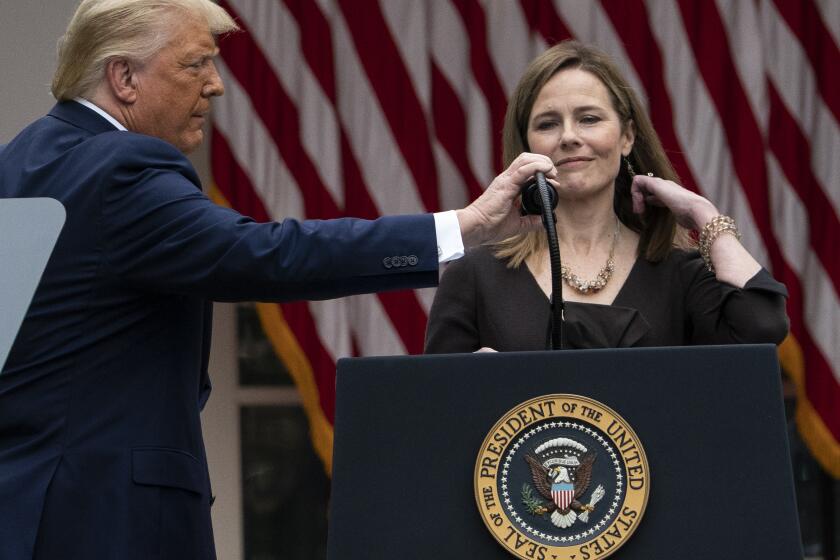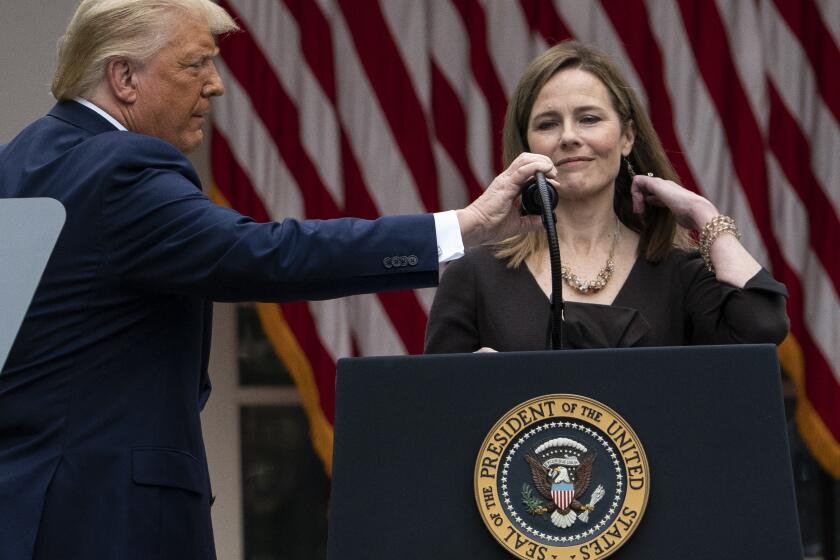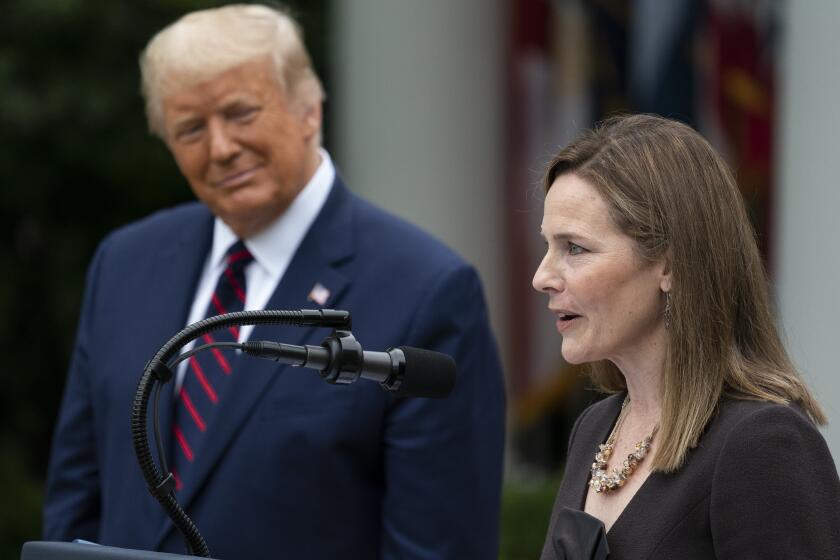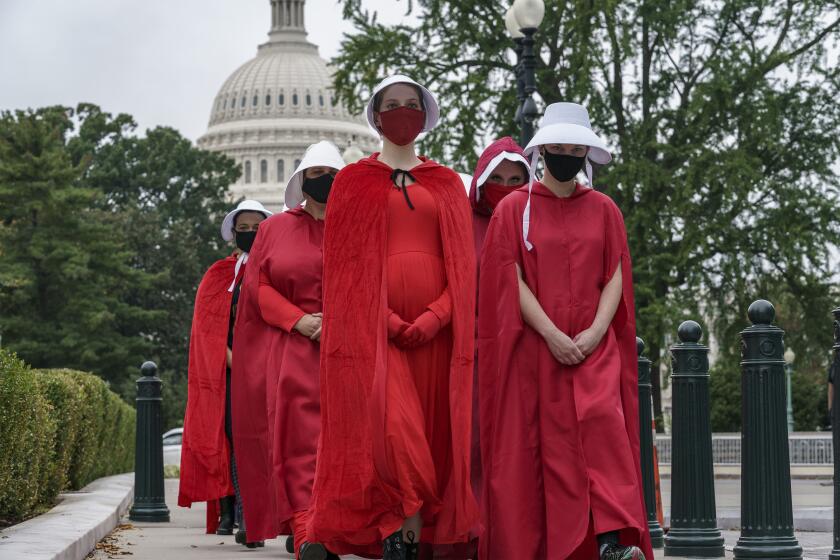Barrett served as trustee at private school with anti-LGBTQ policies
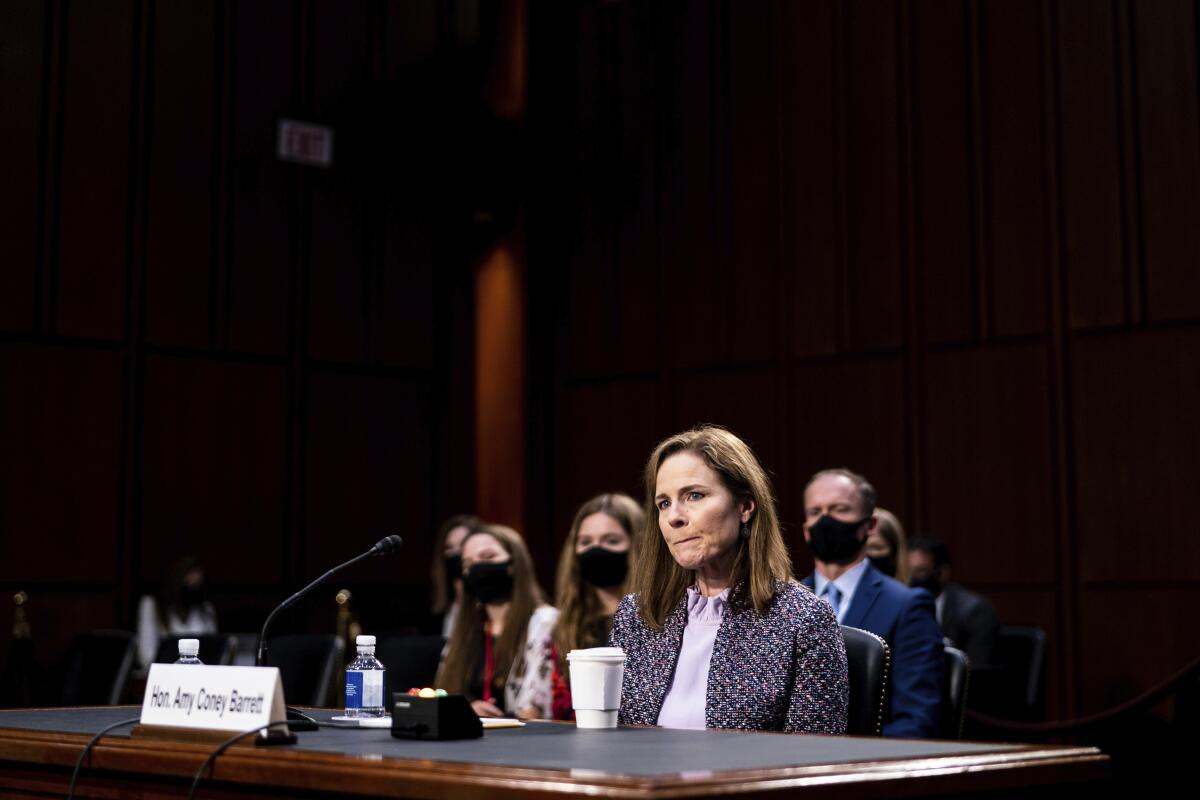
Supreme Court nominee Amy Coney Barrett served for nearly three years on the board of private Christian schools that in effect barred admission to children of same-sex parents and made it plain that openly gay and lesbian teachers weren’t welcome in the classroom.
The policies that discriminated against LGBTQ people and their children were in place for years at Trinity Schools Inc., both before Barrett joined the board in 2015 and during the time she served.
The three schools, in Indiana, Minnesota and Virginia, are affiliated with People of Praise, an insular community rooted in its own interpretation of the Bible, of which Barrett and her husband have been longtime members. At least three of the couple’s seven children have attended the Trinity School at Greenlawn, in South Bend, Ind.
The Associated Press spoke with more than two dozen people who attended or worked at Trinity Schools, or former members of People of Praise. They said the community’s teachings have been consistent for decades: Homosexuality is an abomination against God, sex should occur only within marriage and marriage should only be between a man and a woman.
Interviewees said that Trinity’s leadership communicated anti-LGBTQ policies and positions in meetings, one-on-one conversations, enrollment agreements, employment agreements, handbooks and written policies — including those in place when Barrett was an active member of the board.
“Trinity Schools does not unlawfully discriminate with respect to race, color, gender, national origin, age, disability, or other legally protected classifications under applicable law, with respect to the administration of its programs,” Jon Balsbaugh, president of Trinity Schools Inc., which runs the three campuses, said in an email.
An old directory for the Christian organization People of Praise members shows Supreme Court nominee Amy Coney Barrett served as a ‘handmaid.’
The actions are probably legal, experts said. But scholars said the schools’ and organization’s teachings on homosexuality and treatment of LGBTQ people are harsher than those of the mainstream Roman Catholic Church.
Barrett’s views on whether LGBTQ people should have the same constitutional rights as other Americans became a focus last week in her Senate confirmation hearing. But her longtime membership in People of Praise and her leadership position at Trinity Schools were not discussed, even though most of the people the AP spoke with said her deep and decades-long involvement in the community signals she would be hostile to gay rights if confirmed.
Suzanne B. Goldberg, a professor at Columbia Law School who studies sexuality and gender law, said private schools have wide legal latitude to set admissions criteria. And, she said, Trinity probably isn’t covered by recent Supreme Court rulings outlawing employment discrimination against LGBTQ people because of its affiliation with a religious community.
But, she added, cases addressing those questions are likely to come before the high court in the near future, and Barrett’s past oversight of Trinity’s discriminatory policies raises concerns.
The AP sent detailed questions for Barrett to the White House press office. Rather than providing direct answers, White House spokesman Judd Deere instead accused the AP of attacking the nominee.
“Because Democrats and the media are unable to attack Judge Barrett’s sterling qualifications, they have instead turned to pathetic personal attacks on her children’s Christian school, even though the Supreme Court has repeatedly reaffirmed that religious schools are protected by the 1st Amendment,” Deere said in an email.
Conservative Catholics have provided much of the energy for the Republican effort to move the judiciary to the right. Democrats are treading gingerly.
Nearly all the people interviewed for this story are gay or said they have gay family members. They used words such as “terrified,” “petrified” and “frightening” to describe the prospect of Barrett on the high court. Some of them know Barrett, have friends in common with her or even have been in her home dozens of times. They describe her as “nice” or “a kind person,” but told the AP they feared others would suffer if Barrett tries to implement People of Praise’s views on homosexuality on the Supreme Court.
Tom Henry was a senior at Trinity School in Eagan, Minn., serving as a student ambassador, providing tours to prospective families, when Barrett was an active member of the board.
In early 2017, a lesbian parent asked him whether Trinity was open to gay people and expressed concern about how her child would be treated.
Henry, who is gay, said he didn’t know what to say. He had been instructed not to answer questions about People of Praise or Trinity’s “politics.”
The next day, Henry recalled, he asked the school’s then-headmaster, Balsbaugh (now president of Trinity Schools Inc.), how he should have answered. Henry said Balsbaugh pulled a document out of his desk drawer that condemned same-sex marriage, and explained it was a new policy from People of Praise that was going into the handbook.
“He looked me right in the eye and said, ‘The next time that happens, you tell them they would not be welcome here,’” Henry recounted. “And he said to me that trans families, gay families, gay students, trans students would not feel welcome at Trinity Schools. And then he said, ‘Do we understand each other?’ And I said yes. And I left. And then I quit the student ambassadors that day.”
Balsbaugh, who has since been promoted to president of Trinity Schools Inc., says his recollection of the conversation “differs considerably,” but he declined to give details. He said it is likely he shared the school’s guidelines that at that time “had long been published in the parent handbook.”
Balsbaugh told the AP in an email that Barrett was not involved in the formulation or passage of any policies pertaining to homosexuality. He said Barrett served on the Trinity board from July 2015 to March 2017, and denied that the school’s leadership considered or formulated any new policy related to homosexuality during that time. He didn’t say whether the policy as described by Henry was ever adopted.
Two justices still don’t accept a landmark gay-rights ruling.
Multiple people who spoke with the AP detailed how Trinity’s leadership articulated and put in place policies that in effect barred gay families and employees.
A 2018-19 enrollment agreement obtained by the AP says “the only proper place for human sexual activity is marriage, where marriage is a legal and committed relationship between one man and one woman.” It goes on to say that activities such as “fornication, pornography, adultery and homosexual acts, and advocating or modeling any of these behaviors” are at odds with the school’s core beliefs.
In 2014, the year before Barrett joined the board, the schools’ trustees voted to limit admissions to the children of legally married couples or single parents. At the time, same-sex marriage was not legal in Indiana or Virginia. The wording was softened slightly after the 2015 Supreme Court ruling that in effective legalized same-sex marriage nationwide, though the policy still explicitly opposes LBGTQ relationships.
In addition to the written policies, school administrators made clear verbally they did not want to admit children of gay families, multiple people told the AP.
One described a faculty meeting at the Trinity School in Minnesota, where Balsbaugh, who was then headmaster, said in response to a question that people who subscribed to a religion other than Christianity would be welcome at the school because they were still “seeking truth.” Children of gay couples, on the other hand, would not be accepted, “because their life is so contrary to our beliefs, and essentially that it was a choice,” the person recalled Balsbaugh saying.
Balsbaugh said his recollection of the faculty meeting differed, but declined to give details. He denied this was the position of Trinity Schools, but declined to say whether children of gay couples would be admitted.
Activists costumed as handmaids from “The Handmaid’s Tale” marched in protest of the Senate confirmation of Supreme Court nominee Amy Coney Barrett.
Several people told the AP they were unaware of any openly gay employees and said it was understood that they were not welcome. One gay man spoke with the AP on condition of anonymity for fear of being ousted from his position at the school.
Balsbaugh told the AP that many religious schools and faith-based groups have similar faculty agreements. He would not say whether the school has any LGBTQ teachers.
Cara Wood, 28, attended Trinity School at Meadow View in Falls Church, a Virginia suburb of the nation’s capital, and recalled that the only time the school addressed homosexuality was when students read Dante’s “Inferno” and learned about gay men being in hell. Wood, who is bisexual, graduated in 2010.
“They called it sexual preference rather than ... sexual orientation and typically we just wouldn’t address it at all,” Wood told the AP.
During her confirmation hearing last week, Barrett also framed sexuality as a “preference.” That wording is rejected by LGBTQ advocates because it suggests sexual orientation is a choice.
“I have no agenda, and I do want to be clear that I have never discriminated on the basis of sexual preference and would not ever discriminate on the basis of sexual preference,” Barrett said during the Oct. 13 hearing.
Many former members of People of Praise told the AP that they struggled to reconcile People of Praise’s and Trinity Schools’ religious teachings with their sexual identity, and suffered fear, anxiety and trauma. Many felt they had to leave, even at the risk of being shunned by friends and family.
One 2015 Trinity graduate who grew up in People of Praise recalled members requesting that the community pray that their gay loved ones would “recover” from their homosexuality.
Another Trinity graduate, who spoke to the AP on condition of anonymity because his parents are still in People of Praise and his sexuality remains a sensitive topic for them, was forced to undergo so-called conversion therapy after Trinity administrators learned he was gay at age 16. The widely discredited practice has been condemned by mental health organizations and LGBTQ advocacy groups as pseudoscientific, unethical and psychologically harmful.
People of Praise spokesman Sean Connolly said the group had no knowledge of LGBTQ youths being referred for conversion therapy.
“People of Praise neither advocates for nor pays for such programs,” he said.
Breaking News
Get breaking news, investigations, analysis and more signature journalism from the Los Angeles Times in your inbox.
You may occasionally receive promotional content from the Los Angeles Times.
Massimo Faggioli, a theology professor at Villanova University, said some of the community’s teachings are more in keeping with pre-1960s Catholicism than the modern church.
“It comes from a very literalist reading of scripture,” Faggioli said. “It’s no longer the official language used by the official teaching of the Catholic Church. It’s no longer used by the pope. It’s no longer used by official documents that still have a negative view of same-sex marriage.”
Barrett, in her hearing last week, refused to say whether she agreed with the Supreme Court’s ruling in Lawrence vs. Texas, which in 2003 struck down state laws criminalizing sex acts between people of the same gender. She also repeatedly refused to say whether she agreed with the high court’s ruling in Obergefell vs. Hodges, the landmark 5-4 decision in 2015 that in effect legalized same-sex marriage nationwide.
Barrett stressed that she did not intend to signal any opinion one way or another. If confirmed, she insisted, she would keep an open mind about how she might rule in any future cases.
Alphonso David, president of the Human Rights Campaign, an LGBTQ advocacy group that opposes Barrett’s confirmation, said his group fears “a far-right Supreme Court that could undermine the rights of marginalized communities and the LGBTQ community for decades.”
“Our love is valid, our love is equal and our rights must be,” David said.
More to Read
Sign up for Essential California
The most important California stories and recommendations in your inbox every morning.
You may occasionally receive promotional content from the Los Angeles Times.
